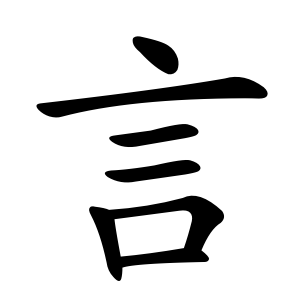言
- word, speech;
It generally means "speech," "language," or "to speak." The character is often used in words related to language and communication, such as 언어 (言語, language).
The representative reading is "말씀 언" (meaning "speech" or "words"), but there is also a reading "화기애애할 은" (meaning "harmonious and friendly"). However, for some reason, it has not been assigned redundantly in the set of standardized (완성형) Chinese characters.
Etymology
言 is an ideogrammic pictograph depicting the image of sound coming out of the mouth (口).
However, there is also a view that it is a phono-semantic compound character combining the semantic component 口 (mouth) and the phonetic component 䇂 (which can be interpreted as '허물 건'). Some opinions interpret 䇂 not as a sound but as an awl or a wind instrument.
In terms of etymology, the character 音 (sound) was formed by adding one stroke inside the 口 of 言. However, in 言, 䇂 becomes the 亖 part, whereas in 音, the vertical stroke of 䇂 is removed, so their forms are completely different.
Usage in Korean
It is the primary radical of the "speech" radical group. It appears in several forms as a radical, such as the side form (訁) and the bottom form, with the side form (訁) being the most common.
Characters with the speech radical generally carry meanings related to actions done through language or things related to speech.
Because there are also characters using the mouth radical (口) that relate to speech, some characters may have the same phonetic components.
Additional notes
In Simplified Chinese, the character 言 itself is not simplified, but the speech radical component on the side is all simplified to 讠.
Characters with 言
- 誌–to record, to write down, to mark, to chronicle
- 認–to know, to recognize, to acknowledge, to admit
- 誓–to swear, to vow, to pledge
- 誕–to give birth, to be born, false, untrue
- 誘–to entice, to lead, to induce
- 語–speech, words, language, to speak
- 誡–to warn, to admonish, to caution, to guard against
- 誤–to make a mistake, to be wrong, to be incorrect
- 誦–to recite, to chant, to intone, to read aloud
- 說–to speak, to explain, to say
Words that derived from 言
- 격언(格言)–maxim; proverb; saying; adage; aphorism
- 방언(方言)–regional dialect; vernacular
- 선언(宣言)–clear statement; declaration; proclamation; announcement
- 언급(言及)–mentioning; referring; reference
- 언론(言論)–press; journalism
- 언문(言文)–speech and writing; spoken and written language
- 언어(言語)–language
- 언행(言行)–words and actions
- 예언(豫言)–prediction; forecast; prophecy
- 예언자(豫言者)–predictor; foreteller; prophet
- 조언(助言)–advice
- 증언(證言)–testimony
- 卜一一口 (YMMR)
- ⿳ 亠 𠄠 口 (G H T V)
- ⿱ 亖 口 (J K)
